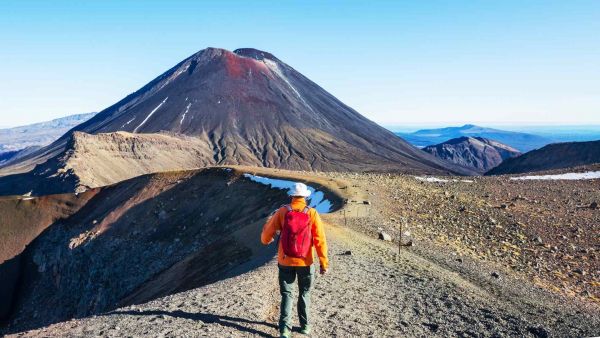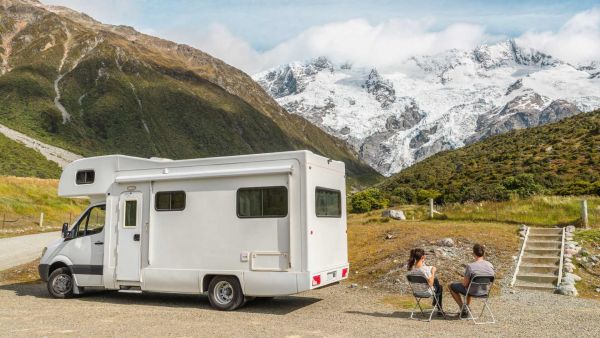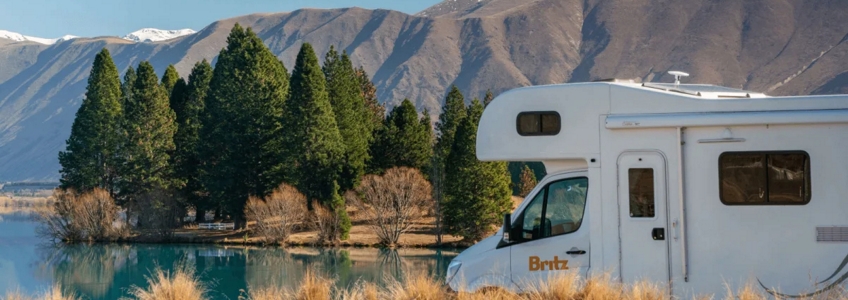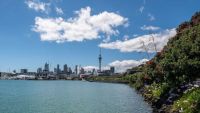Whether a nature enthusiast seeking outdoor escapades or a curious traveller looking to immerse yourself in a new world at your own pace by renting a motorhome, New Zealand's unique allure calls. We cover useful travel tips, insider information, and what to expect when travelling to New Zealand so you can explore this country like the locals do.
Plan Your Trip
When to Visit
New Zealand has a largely temperate climate that varies significantly in different regions. Generally, Summer (December to February) offers warm temperatures and outdoor activities, while winter (June to August) brings snow-covered landscapes for skiing enthusiasts. Spring and fall offer a mix of mild weather and fewer crowds.
The optimal period for enjoying activities in favourable weather conditions is typically from November to April. During daylight savings, you'll benefit from extended sunlight hours and later sunsets, allowing for more outdoor pursuits.
What to Bring
Pack clothing suitable for the weather during your chosen travel dates. New Zealand's climate can vary widely, so include easily adjustable layers. Don't forget sturdy footwear for hiking, swimsuits for beach visits, and a waterproof jacket. Sunscreen, insect repellent, a universal adapter, and a portable charger are also must-haves.
Staying connected to the internet in New Zealand is straightforward—many accommodations and public spaces offer free Wi-Fi. Consider purchasing a local SIM card or renting a portable Wi-Fi device if you need constant access. Don't forget to acquire the appropriate adapter for plug compatibility; New Zealand uses Type I plugs featuring three flat pins in a triangular pattern.
Where to Go

New Zealand offers an array of experiences that cater to every interest. For outdoor enthusiasts, explore the hiking trails of Tongariro National Park, the fjords of Fiordland National Park, and the coastal splendour of Abel Tasman National Park. Seek adrenaline rushes with bungee jumping in Queenstown, skydiving in Taupo, or skiing and snowboarding trips during winter at many ski resorts nationwide.
Visit Rotorua's geothermal wonders or attend a traditional Māori performance. Take it easy with walking tours and discover the vibrant city life of Auckland, Wellington's arts scene, and the captivating landscapes of the South Island.
While these are just some examples of things to do in New Zealand, you should craft your itinerary to align with your trip's dates. Reference travel guides on the best things to do in the area, depending on the time of year.
Before You Depart
Prepare the Essentials
- Passport Validity: Ensure your passport meets the required validity for entering New Zealand. To avoid any issues, confirm that your passport is valid for at least three months after your intended departure from New Zealand. Alternatively, passports issued by a country with a New Zealand embassy or consulate should be valid for at least one month after your planned departure.
- Apply for a Visa: If you are not a New Zealand or Australian citizen, you may need to apply for a visa or New Zealand Electronic Travel Authority (NZeTA) when travelling or transiting New Zealand. Check the entry requirements thoroughly before you purchase your ticket.
- Buy Travel Insurance: Although optional, we highly recommend acquiring travel insurance to protect yourself from the unexpected.
- COVID-19 Requirements: COVID-19 vaccinations and pre-arrival testing aren't required to enter New Zealand. However, if you exhibit symptoms upon arrival, taking a Rapid Antigen Test (RAT) is recommended; if positive, isolate for five days. The government recommends all positive cases undergo a free PCR test to assist the NZ government in monitoring potential new COVID variants.
Going Through Customs
Starting in late August 2023, travellers arriving at New Zealand's international airports will have the option to complete a digital declaration. Regarding biosecurity and customs, being transparent about your belongings is important. New Zealand has stringent biosecurity regulations to safeguard our indigenous wildlife and plants from potential foreign threats. We recommend carefully consulting the list of prohibited items and declaring items if unsure, as failure can lead to a $400 fine.
Payment Methods
The official currency in New Zealand is the New Zealand Dollar (NZD). Major credit cards such as Visa, MasterCard, and American Express are widely accepted in hotels, restaurants, shops, and attractions. Contactless payments using cards or mobile devices are also becoming increasingly popular nationwide. This method proves convenient for swift purchases, and many establishments have warmly adopted this technology. Nevertheless, carrying some cash is advisable for smaller businesses or places where card payments may not be an option. Currency exchange services and ATMs are widely accessible in major cities and tourist hubs throughout New Zealand.
Health and Safety
If you are injured while on holiday in New Zealand, you're covered by the Accident Compensation Corporation (ACC). Treatment at accident and emergency (A&E) clinics, general practitioners, or emergency departments in public hospitals may be free or subsidised (this is where travel insurance comes in handy).
Alternatively, you can find pharmacies and chemists nationwide that dispense over-the-counter medications and professional advice for milder conditions.
In an emergency, phone 111 for the police, ambulance, or fire service. This number is a free call on your mobile phone. Phone 105 if you need to speak to the police about a non-emergency situation.
Getting Around
Transportation Options
- Bus and Coach: Numerous travel companies offer guided tours and flexible hop-on-hop-off options, perfect for those who want to explore without the hassle of driving.
- Public Transport: Buses and light rail systems offer efficient urban transportation solutions in city hubs. Instead of purchasing pricey one-time tickets, we recommend buying a reloadable travel card for seamless transactions.
- Rail: Travelling by rail in New Zealand offers a unique landscape perspective. The Northern Explorer and TranzAlpine are popular options for experiencing the country's beauty by rail.
- Ferries: In cities like Auckland and Wellington, ferries provide a unique way to travel between different parts of the city or to nearby islands. Alternatively, the Interislander and Bluebridge ferry services link the North and South Islands, catering to passengers and vehicles. This smooth connection between the main islands offers travellers scenic views of the Cook Strait.
- Domestic flights: This is a convenient option for covering longer distances between regions or islands.
Curate a Self-Driving Tour

Renting a car or campervan allows you to explore New Zealand at your own pace; the well-maintained road network offers easy access to popular attractions and off-the-beaten-path destinations.
When renting a car or motorhome, you'll need a valid driver's license written in English or accompanied by an approved translation. While short-term visits typically don't require international driving permits, having one can be advantageous.
Carry your passport, rental agreement, and insurance proof while driving. In New Zealand, you drive on the left side of the road. This change might take some adjustment if you're used to right-side driving. New Zealand's roads vary from well-maintained highways to narrow, winding roads—be prepared for changing road conditions, especially in rural and mountainous areas. Roundabouts are prevalent in cities, so yield to vehicles already on the roundabout and follow lane guidance signs. We recommend familiarising yourself with New Zealand's road rules before renting a car or campervan.
Secure Accommodation
Many accommodation options are available, catering to diverse budgets and preferences. From lavish hotels to budget-friendly hostels, there's something for everyone. If you're travelling around in a campervan, holiday parks, campgrounds, or freedom camping spots provide personalised comforts. If you're looking for a unique accommodation experience, a farm or homestay allows you to make friends and embrace some local hospitality.
Research multiple booking platforms, read reviews, and compare prices before making a reservation. This research ensures you find the best value for your preferences. We recommend booking in advance to secure your preferred accommodation during peak seasons. New Zealand experiences high tourist seasons, especially during summer (December to February) and school holidays.
Respectful Travel Practices
Although English is the predominant language in New Zealand, you might encounter unfamiliar place names or signs. These are often in te reo Māori as a tribute to the indigenous people of New Zealand. The Māori, whose culture and language are integral to the nation, are the second largest ethnic group in the country after European New Zealanders (Pākehā). Learning a few basic phrases can signify your cultural respect.
When encountering Māori cultural sites, artefacts, or practices, approach them with reverence and a genuine desire to learn. Be polite and receptive to comprehending the cultural context. When discussing sensitive subjects, such as colonisation and land issues, consider the historical significance and potential impact on Māori communities.
New Zealand takes conservation seriously. Respect the environment by picking up your rubbish and minimising your impact on natural areas. Whether on land or in marine settings, maintain a respectful distance from wildlife, refrain from feeding them and honour their habitats. Adhere to marked trails to safeguard delicate ecosystems and prevent soil erosion when hiking or exploring.
See All That New Zealand Has to Offer, At Your Own Pace
We hope our little guide has prepared you for what to expect when travelling to New Zealand. Consider renting a motorhome for the ultimate opportunity to explore this diverse paradise at your own pace. Beyond serving as mere transportation, you get a cosy home on wheels that empowers you to craft a unique journey and forge unforgettable memories.
New Zealand Motorhomes is one of the country's largest and longest-running campervan hire platforms. We boast many advantages, including the most competitive rental prices with the absorption of Visa or MasterCard merchant charges. We are passionate about what we do and would love to make your trip here unforgettable.
Talk to us, and we will recommend the most suitable campervan for your purpose and budget. We also have guides and example itineraries on which you can base your trip for a comprehensive holiday. Book a motorhome rental in Auckland, Christchurch, and other areas throughout the country, and travel in style today!


